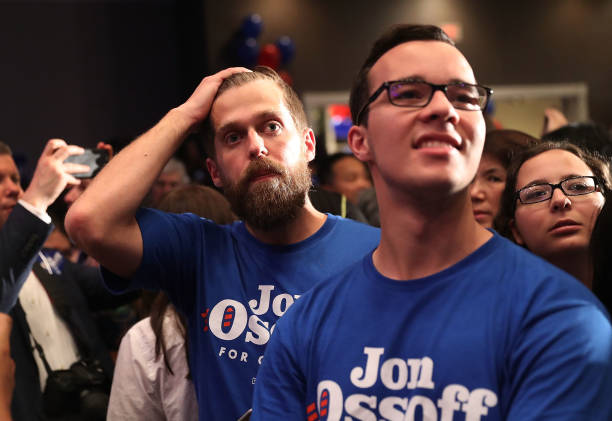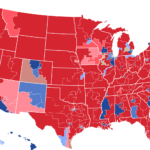$30,000,000 dollars later, people still aren’t sure what Jon Ossoff stood for, and cared about, and the Democratic party leadership and consultant class still don’t know how to win. For the price of a dozen competitive House elections or statewide campaigns–and hundreds of local and state legislative contests–Democrats are left standing in the same place they were after November 2016 in Georgia’s 6th district, and across the country. After having every resource at his disposal, and all the help and motivation in the world, Ossoff was left roughly in the same place he was two months ago–after significantly more money (both direct campaign spending, and via the Democratic party and allied groups), door knocks, mail pieces, and every other campaign outreach option on the table was utilized by the campaign.
Ossoff lost to a fallen former GOP rising star Karen Handel, who had lost her last two Georgia elections (2010 for Governor, and 2014 for Senate). Handel rubbed much of her primary opposition the wrong way, was hampered by downward approvals for Donald Trump, ran a mostly flat campaign, and was outraised and outspent by a few million dollars, while also facing a media disadvantage that saw Ossoff have a 60% share of voice in terms of tv and radio. Ossoff also got more positive national media coverage, had more volunteers, knocked on significantly more doors, sent out more mail, and talked to more voters overall.
GA-06 was a GOP held district, that despite Clinton’s significant overperformance, is still GOP leaning (R+7 in the PVI). That said, Democrats shouldn’t be arguing the district is unwinnable; Ossoff led in multiple polls, had two serious chances at victory (April and June), and Democrats had never previously ran a serious candidate, or invested money in the district. Ossoff’s improvement can largely be tied to the fact that spending does move the needle to an extent, but it wasn’t enough. Ossoff’s polling lead was squandered away by a poor final salvo, and most likely GOP voters being motivated by the horrific terror attack against GOP congressman on a baseball field in Virginia.
At the same time last night, Democrat Archie Parnell lost SC-05’s special election by a much smaller margin than its R+9 performance rating. Parnell was outraised and outspent, and had significantly less resources, volunteers, and cash than Ossoff, despite the fact he performed better in a low turnout election. Ossoff should not have gotten the amount of outside spending, and party spending that he did, as that money would have been more useful elsewhere. Yet he wasn’t cut off. Despite his own robust fundraising, there should have been limits and a real budget. Ossoff got the record high turnout for a special election that he wanted, but the Democratic turnout strategy resulted more than anything else in vote shifting, as normal election day voters simply voted early or by mail, rather than bringing new voters to the ballot box.
Despite having some of the best consultants, vendors, and staff that money could buy according to some experts, Ossoff ran a failed campaign, and proved why Democrats still don’t know how to win, especially in GOP leaning districts. Here is a condensed list of reasons why:
1: Ossoff Lacked a Clear Message and Had an Irrelevant Platform
If you visit Ossoff’s website, you’ll see a smorgasbord of issue positions, written in a cold, distant, unengaging tone, and without any real priority placed on any specific issue. This matches Ossoff’s advertising, mail, and messaging overall. Months later, I’m not sure anyone has a clear answer what Ossoff stands for, or what his top agenda items would have been if elected to Congress. He was neither “Anti-Trump,” nor “Progressive” or “Centrist,” or frankly anything else.
Entering the race with low name recognition and limited community ties to the district, less partisan voters didn’t connect that closely with the former Congressional staffer and filmmaker, and many of these infrequent or “centrist” voters that may have been persuadable appeared to feel that Ossoff winning or losing wouldn’t make a huge difference in their lives. Ossoff was against the Trump healthcare proposal for example, but never detailed what solutions he personally supported for healthcare (Obamacare as-is, Obamacare with changes, Single-Payer, or another approach)–and he also failed to take a hard stand on issues like police accountability (after recent court rulings in favor of officers who killed on the job), student loan debt, or immigration, which may have further motivated/swung the electorate in his direction.
Ossoff instead focused in particular on the vague notion of “government reform” that neither inspires people, nor generates much agreement on what that means (Sanders supporters will call for revolution, Trump backers will call for draining the swamp, etc.). He also focused on debt and spending issues, an issue that really only motivates conservatives that tend to be deficit hawks. Ossoff’s advertising and messaging was rolled out before focus groups and polling was fully completed, without the input of campaign operatives and local activists that had done work in GA-06 previously. On top of that, it changed over the course of the race like a weather vane, a tactic that is frequently ineffective, and panned across both sides of the aisle (see Mitt Romney 2012 and Charlie Crist 2014).
Ossoff and allied groups focused on attacking Handel over vague taxpayer funded expenditures she had made as Secretary of State years prior, that voters frankly saw as irrelevant, unless they already had a bad taste in their mouth about Karen Handel.
In short, the voters that could have put Ossoff over the top did not feel he would change their lives for the better, or fight for them, which is a messaging failure by the Democratic party at the federal level as well as the local level.
2: Ossoff Lacked Experience, and It Showed
Although he improved over the course of the campaign, early on Ossoff was raw; he had inconsistencies and exaggerations in his resume on national security, and other issues. When asked about whether he would support Pelosi for Speaker of the House, he gave no answer, and he couldn’t firmly grasp either local issues, or simple questions about his opinions about Donald Trump for example. The media likes to play “gotcha politics,” but regardless, when you’re running in the most watched race in America, you have to be ready for the kitchen sink. The GOP was able to pounce on Ossoff’s thin resume, misstatements, and early stumbles to hamper him in April, and he couldn’t make up the gap by June. This further demonstrates that even candidates that Democrats vet, recruit, and fully support, are often unprepared for primetime, and his staff didn’t race to address these issues out of the gate.
3: Democrats Flooded the Airwaves
Residents of the Atlanta media market were harassed by blaring ads, hours of radio voiceovers, and 50+ mail pieces just in recent weeks promoting Ossoff alone. This doesn’t account for the spending in the months prior to April, or the GOP spending, which was frankly just as abusive. This abrasive, carpet bombing media strategy makes consultants, ad buy vendors, and tv/radio stations rich, but eventually the law of diminishing returns becomes applicable, and if anything, the sheer amount of advertising makes voters tune out, and disengage from the race, rather than keeping up with the latest developments.
Here ismore than 50 mailpieces a sampling of one Atlanta voter received; this is the equivalent of setting money on fire, as even political junkies get fatigued at a certain point. Rather than running a microtargeted media strategy that probably would have been more effective, Dems went “all out.” While the GOP also ran a ton of ads, they at least focused on a few themes, in particular “West Coast Liberals” and opposition to “Nancy Pelosi,” which frankly worked, despite being mocked. Ossoff’s media strategy mirrored the national failure of Hillary Clinton, who ran significantly more ads than Trump, to limited effect in places like Ohio and Florida.
4: Ossoff’s Ground Game Was Erratic and Overcooked
Become of the sheer level of volunteer (and paid canvassing) interest in the GA-06 race, Ossoff had a significantly larger ground game footprint than Handel. However, this ground game was erratic, and overcooked. Canvassers were sent out to canvass anyone and everyone with a pulse, voters were getting door knocked multiple times per day, for weeks, and many felt disrespected, in particular when their responses were not accurately recorded, and they continued to be contacted after expressing they wanted to either not be contacted again or they had made their mind up and no longer wished to hear from the campaign. Ossoff’s team focused on hitting their benchmark numbers, rather than simply applying some southern common sense about suburban family residents.
Many canvassers were also not comprehensively trained, and given the fact Ossoff attracted many extreme partisans, a lot of his volunteers ended up expressing their personal political views while working for the campaign, often in a detrimental manner. Additionally, many groups, and organizations, some legitimate, others outright Scam PACs and 501(C)3/(C)4s, did their own canvassing and voter contact operations. Given that these could not be legally coordinated with the Ossoff campaign, lots of toes were stepped on, and voters were given inconsistent, mixed messages.
Towards the end of the race, Ossoff and allied groups also got overconfident and started doing outreach to Republican voters. This had the effect of motivating “sleepy” Republicans into voting for Handel, and likely just alienated them further from Ossoff, making them come home to the GOP. This awakening of the giant is something that the Clinton campaign, with their failed voter data modeling, also experienced.
Hitting metrics is great to an extent, and many of his staff will get job promotions for their “ground game success,” but the ball was dropped in terms of what approach would have won in GA-06. Many canvassers of color also complained they were not given enough support, as they faced harassment from some local residents and local law enforcement. The Ossoff campaign and allied groups failed to step up and show support for them in a bold manner.
Ossoff also failed to microtarget his message at the neighborhood level, or listen to direct door to door input from voters, despite how this information would have been invaluable.
5: Pelosi was a Drag on Democratic Chances
It’s time for Nancy Pelosi to step aside as Democratic leader in the House. After losing four straight House elections (2010-16), she’s been an anchor for every Democratic House candidate in a special election thus far. Regardless of people’s personal opinions about her views or leadership, her reputation has been tarnished nationally by the GOP in a manner that has made it impossible for her to campaign for House candidates in targeted districts. These candidates are also put on the spot about whether they share her views on the issues, and will support her for Speaker. Having a polarizing, unpopular lightning rod as House leader is damaging Democratic chances.
On a related note, there should be mass resignations in the DCCC, rather than their continued spin and tone setting. It’s time for accountability, given that their nationally focused approach, standardization of campaigns, and narrow, elitist outlook has failed to secure victory since 2008. The DCCC has been spinning its wheels for too long, and they have made too many excuses; most Democratic House gains have been made in spite of them or without their help.
6: Democrats Failed At Uniquely Appealing to Voters of Color and Young People
The counties of GA-06 (DeKalb, Fulton, and Cobb) do not provide ballots in Spanish (or any other language), and the Ossoff campaign+allied groups failed to make a real push to change this in advance of the GA-06 election. A lack of voter information in their preferred language tends to depress voter turnout among Hispanic and Asian voters. Furthermore, many local community leaders felt Ossoff was silent and disengaged on racial and social justice issues, and while doubling down on his “centrist” message, he overlooked things like the recent Philando Castile shooting verdict.
Voter suppression, economic and educational inequality, racism, police brutality, classism, and a lack of opportunity are real issues in GA-06, as many working class resident, and residents of color feel left behind by rises in the cost of living in the area. In suburban, diverse districts such as GA-06, Democrats need to take a much more aggressive approach on voting and civil rights issues, in a genuine, and consistent way. They also need to do more listening to the local community, and voters of color.
Young people’s limited turnout in the special election also hampered Ossoff’s chances. Despite being a young candidate himself, Ossoff didn’t go overboard connecting with 18-25 year-old voters that were not already politically engaged, and didn’t offer a unique platform that would turn non-political young people into his voters. This tweet thread from VOX reporter Jeff Stein is a small anecdote of this.
These two factors, combined with Democrats’ continued failure to gain the support of more than a quarter of male voters, resulted in yet another defeat. It should be noted that Democrats cannot keep bleeding support among men and expect to win.
7: Local Infastructure and Community Engagement Was Lacking
For all the money that was spent, and sweat that was poured, local infrastructure was poor in GA-06 before, and it’s going to be poor tomorrow. The local media is no more open to the Democratic message than they were six months ago, and many voters and leaders in the community feel harassed and abused, rather than warmly welcomed and supported by the Democratic party and its leaders.
Ossoff went with out of state vendors, senior staff, and consultants. Allied groups spent and raised money off his campaign, without leaving much for his hardest working local supporters in the aftermath, and few long-term relationships have been built from the top level. Whether GA-06 is targeted again (it likely will be), and whether Ossoff runs again, Democrats still lack a bench in metro Atlanta and across the country, and voters’ opinion of the party and its leaders is getting worse, not improving.
Summing it All Up
Moving forward, given the cut and run nature of Ossoff’s spending (heavy on ads, out of state staff, and temp vendors) will leave a skeleton of infrastructure in the district, damaging efforts in local and statewide Georgia races, just like what happened after Rob Quist’s defeat in Montana’s recent special election. Blaming gerrymandering and “outside spending” on Ossoff’s defeat is simply cheap spin from those who are too heavily invested in the status quo and want to keep getting paid hefty sums of money, donated based on faith in the system.
Plus, Democrats are going to have a hard time taking the House without local staff to draw from, and most candidates aren’t going to have access to a fraction of the money Ossoff had. If Democrats can’t swing districts with 30 Million dollars, how will they do with 1-2 Million? A lot needs to change, and with the kind of money that is pouring into Democratic coffers since November 2016, a lot of progress could be made at all levels, but that’s not happening as of right now.
-Steen Kirby is a founding partner and lead elections strategist for Bold Blue Campaigns, a consulting company that focuses on localizing races and assisting Democrats nationwide
Main Photo:














103 Responses
Particularly agree about Osoff. When you lose to an opponent who is unabashedly homophobic, you have to ask yourself, as a party….what the heck kind of candidates are we running here?
Hadn’t realized that the Dems f****d the dog so thoroughly with this one, but it doesn’t surprise.
All that the Democratic Party is now is a gang of hacks, er, “consultants”, desparate above all to keep their inflated revenue streams flowing. Yeah there should be mass resignations in the DCCC — but what’s changed between now and last November? The DCCC, the DSCC, the DNC should ALL have been completely purged more than six months ago. But they haven’t been have they? The ticks have only burrowed deeper into the host.
So for all practical purposes the Democratic Party is ALREADY dead. It can’t perform the most basic function that it’s supposed to. Meanwhile it sucks up money and time that could be better spent. Its most (hell, its ONLY ) popular front man, Sanders, doesn’t even belong to it.
Sanders would do America an immense favor if he took his followers and simply walked away from the Dem zombie. Dem shills will whine and howl about third parties and “being reasonable”, and before long (days? hours?) they’re be wallowing in another Big Smear campaign. It doesn’t matter. The point is that the Sanders bloc wouldn’t be about building a third party. It’d be about building a **genuine** **second** party.
What is there to lose? Dem tapeworms will **never** yield their sweet gigs, and they’ll “lead” their party to one destination, defeat.